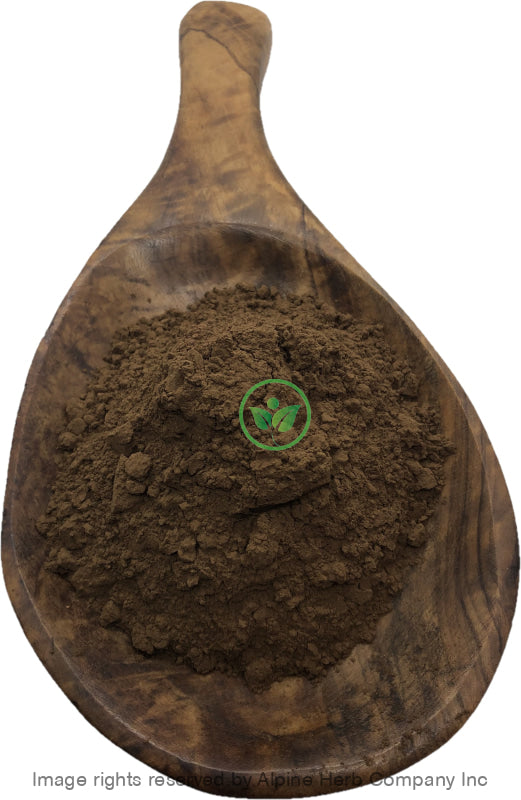Carob Powder – Raw Alpine Herb Company Inc.
$ 8,49 $ 5,09
Botanical Name: Ceratonia siliqua
Common Name:
- English: St. John’s Bread
- Also, known as: Carob, Sugar Pods, Locust Pods, Algaroba, Bharout, Kharnub Shaami,
Origin: Spain
Harvested: Cultivated
Parts Used: Pods
General Information:
Ceratonia siliqua is an evergreen tree native to the Mediterranean region, and also commonly found in the south of Spain, and has been cultivated for more than 3000 years. The tree is slow-growing and drought resistant. It reaches a height of about 30-40 feet. The wood of which has a pretty pinkish hue. Leaves are glossy and pinnate with two or three pairs of oval blunt-topped leaflets, leathery texture, and color shiny dark green. Flowers in small red racemes followed by flat pods 6 to 12 inches long and fully 1-inch wide, an inch thick, a shiny dark brown purple color. They do not split open when ripe; they contain many seeds in a line along the center of the pods, each seed in a separate cell of fleshy pulp. The tree does not bear fruit for the first fifteen years. Once it begins to produce, thousands of pounds of pods can be harvested in a year.
This tree is much cultivated in dry parts because its long roots can grow deep enough in the ground to find moisture. The pods contain a large amount of mucilage and saccharine matter of pleasant flavor, and are largely employed for feeding all sorts of animals, and in time of scarcity for human consumption. In 1811 and 1812 they formed the principal food of the British cavalry during the War.
The pod pulp was fermented and made into an alcoholic drink, and the pods were roasted and ground to make flour. The powdered pods are added to foods as a thickener and stabilizer and used as a substitute for cocoa.
How to use:
Powdered Herb:
There are different ways to use powdered herb.
Food Preparation: You can add powdered herb to any super food herbal smoothie, sauces, spreads and even cookies. Also for children, you can mix powdered herb with honey or glycerin to make paste. The thicker the paste, the more potent and herbal in taste. The sweet taste of honey and glycerin will help medicine go down. This method is also known as “Electuaries”.
Capsules: Encapsulating your own powdered herb at home, gives you assurance that the contents of the capsules are pure herb and no filler or any other products. These capsules can be taken with liquid.
Poultice: Poultice can be made with an herbal powder and liquid (mostly water) to form a paste which is then applied to the skin. This method is very helpful for skin conditions.
Herbal shot: Powdered herb can be mixed with water, fruit juice or other liquid to make herbal shot.
Precautions:
You should consult with a qualified healthcare practitioner before using any herbal products, particularly if you are pregnant, nursing, or on any medications.
All information on this website is for educational purpose ONLY
This information has not been evaluated by Health Canada.
This information is not intended to diagnose, treat, cure, or prevent any disease.
| Unit Size | 100g, 200g, 400g, 1kg |
|---|
Prompt shipping and expert packing
Thanks to our longstanding association with UPS FedEx DHL as well as other leading global carriers, we can offer a variety shipping options. Our warehouse staff is highly trained and will be able to pack your goods in accordance with our precise and exact specifications. Your items will go through an exhaustive examination before they will be securely packaged before being delivered. We ship to hundreds of thousands of customers daily in different countries. This is a sign of our determination to become the largest online retailer worldwide. Warehouses and distribution centers are located throughout Europe as well as in the USA.
Note that orders containing multiple items are processed according to the particular item.
We will thoroughly inspect all items ordered before shipping. Most orders are shipped within 48 hours. The delivery time will be between 3 and 7 working days.
Returns
The stock market is always changing. It's not entirely managed by us since we're involved with several entities, including the factory and the storage. Therefore, the actual inventory could fluctuate at any moment. Please be aware that it is possible that your order could be out of stock after you've placed your order.
Our policy lasts for 30 days. If it's been more than 30 days since the date you purchased your item We're sorry to say that we can't offer you a full exchange or refund.
You can only return a product if it is unused and still in the same state as when you received it. The item should be in the original packaging.
Related products
Herb Powder
Herb Powder
Herb Powder
Herb Powder
Herb Powder
Herb Powder
Herb Powder
Herb Powder
Herb Powder
Herb Powder
Herb Powder
Herb Powder
Herb Powder
Herb Powder
Herb Powder
Herb Powder
Herb Powder
Herb Powder
Herb Powder


































